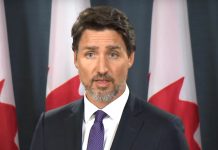THE softwood lumber dispute affects tens of thousands of B.C. jobs, and forest-dependent communities across B.C. Earlier this month, the U.S. Department of Commerce chose to drag out this dispute by signaling their intention to impose unfair and unfounded duties on Canadian softwood exports.
Our government has responded. We’re fighting for a fair deal that’s good for B.C. workers, for the industry, and people in our communities. And we won’t back down.
In my first week as Premier, I travelled to Ottawa and Washington D.C. to deliver a message to the Prime Minister, and to U.S. Trade Representatives. I made it very clear that B.C. was interested in a fair, long-term deal to avoid time and money wasted in duties and litigation.
The reality is the U.S. lumber industry cannot produce enough lumber to meet U.S. demand. A reliable source of softwood lumber products from B.C. and Canada will ultimately benefit the U.S. housing industry and American home-buyers.
Despite this, the U.S. continues to attack its closest friend, neighbour and ally while bowing to the U.S. lumber coalition and pursuing protectionist measures to constrain Canadian lumber imports and drive up U.S. lumber prices.
Ultimately the U.S. government is ramping up costs for American consumers and putting the interests of its lumber lobby ahead of what’s fair and what’s good for the American economy. It doesn’t work for people and it doesn’t make sense on either side of the border.
British Columbia is the dominant player in Canada’s softwood market. Over 50 per cent of U.S.-bound softwood comes from B.C. These unfair duties put thousands of B.C. jobs on the line and create uncertainty for the people, families and communities who depend on those jobs.
B.C. is a fair and competitive trader. Every time the U.S. has imposed unfair duties on softwood, the courts have sided with Canada and our industry has been vindicated. We will continue to defend B.C.’s interests in the softwood lumber dispute. If that means litigation to defend B.C. against unfair tariffs on Canadian softwood, so be it. We would prefer to pursue another solution, but if the U.S. insists on going down this road, I am confident we will be vindicated once again.
In the meantime, we’ll make sure workers, families and communities have the support they need to mitigate the impact of these duties. We’ll also continue to pursue growth in other markets for B.C. wood products to. To that end, our government is leading a forestry sector trade mission with over 35 senior forestry executives to China and Japan later this month. And we’re committed to expanding our innovative wood products sector and developing policies that prioritize the use of B.C. wood in infrastructure projects.
B.C.’s forest sector is an integral part of a sustainable, vibrant B.C. economy. We stand united with B.C. forest workers, industry leaders, and communities, and we’ll fight for the 60,000 people who rely on B.C.’s forest sector for their jobs and livelihoods.
You can count on us to keep fighting or a fair deal.













